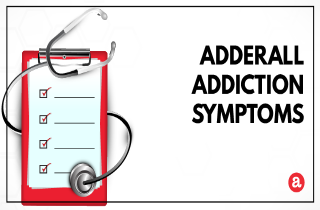Are you wondering if you are Adderall dependent? When does physical dependence cross the line and become addiction? Here, we review the common signs and symptoms of Adderall addiction as well as recommended treatments for Adderall addiction. Then, we invite your questions at the end.
Adderall addiction signs
Adderall is a distribution brand name for a compound pharmaceutical consisting of amphetamine and dextroamphetamine mixed salts generally prescribed for ADHD (attention-deficit hyperactivity disorder), narcolepsy, and is occasionally prescribed for cases of severe depression. Adderall is available as an instant release formula and an extended release formula, called Adderall XR.
Adderall works in the brain by causing stimulation and excitation of the central nervous system. But in addition to the positive effects of Adderall use, physical dependence is expected, even when the medication is recommended by a physician. In fact, long-term use or chronic use of Adderall for a period of at least a month, or two can cause your body to need Adderall in order to function normally.
The bottom line is this: you know you are physically dependent on Adderall when you stop taking it and experience withdrawal symptoms. You know that you are addicted to Adderall when you stop taking it an cannot stay stopped due to psychological cravings or compulsion. Dependence is a physical phenomenon. Addiction is a psychological phenomenon.
Symptoms of Adderall addiction
After a period of continuous use or serious abuse of doses of Adderall, signs of addiction can manifest. During this process, the whole body and mind are affected by the drug. The medical criteria to clarify the existence of drug addiction is outlined in the The Diagnostic and Statistical Manual of Mental Disorders (DSM), published by the American Psychiatric Association for drug addiction. The four main characteristics of Adderall addiction are:
1. Compulsion to use Adderall
2. Continued use of Adderall despite negative consequences to health, work, or home
3. Drug cravings
4. Loss of control of drug use
However, other signs of addiction can also be present which affect the body and a person’s behavior. The most common signs and symptoms of addiction to Adderall include:
- aggressive behavior
- blurred vision
- changes in sleep habits
- constipation
- dry mouth
- hallucinations
- headaches
- loss of appetite
- nausea
- nervousness
- paranoia
- pounding or fast heartbeat
- restlessness
- seizures
- shortness of breath
- impaired speech
- stomach pain
- swelling`
- uncontrollable shaking
- weakness in arms and legs
- weight loss
Adderall addiction symptoms: Can they be treated?
Yes, symptoms of Adderall addiction can be treated. The first step in treating Adderall addiction is to address physical dependence to Adderall. At the moment there are no approved medications for treating Adderall dependence, however certain over-the-counter medications such as NSAIDs can be used to address withdrawal symptoms. Once Adderall is out of your system, then you must address the psychological aspects of the addiction. Adderall addiction, when properly addressed, can result in long term sobriety and abstinence from drug use (just like any other drug addiction). But how can you help someone that you suspect is addicted to Adderall?
Have you ever heard of an intervention? It is a process of meetings with the addict’s family in order to plan and organize the further actions to get an addict treatment. Interventions require a thorough research into treatments and facilities options. After preparation, a direct discussion occurs with the addict, where the possible negative outcomes are outlined in order to encourage an addict to seek treatment.
The two main options for addiction treatment are inpatient and outpatient treatment programs. Residential (inpatient) Adderall addiction treatment centers offer the full scope of evidence based practices for substance abuse, supervised by a professional staff, who are available to help for hours a day. This type of treatment is preferred when signs of addiction are more severe, because the addict requires a change of environment and structure. However, for those who can maintain their daily duties and address Adderall abuse simultaneously, outpatient addiction programs exist. During outpatient treatment, mandatory treatment requires weekly attendance at group meetings and individual counseling, usually over the course of 10 weeks or more.
Signs of Adderall addiction questions
If you still have questions about the signs of Adderall addiction after reading this article, please feel free to post your question in the comments section below. We will do our best in providing you with a personal and prompt answer.










Related Posts